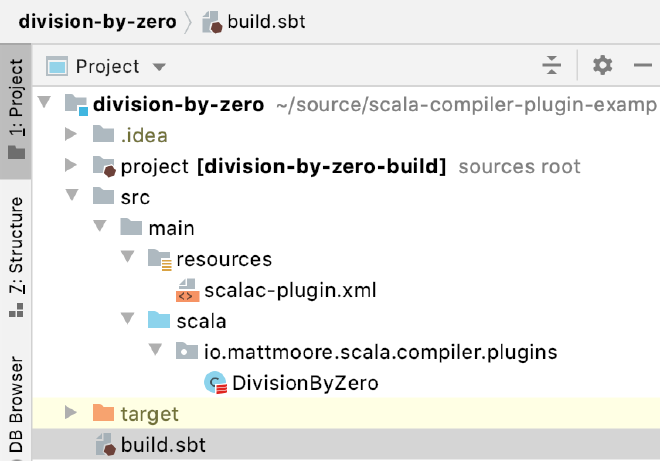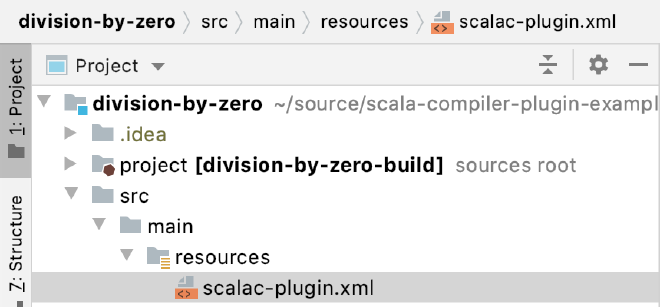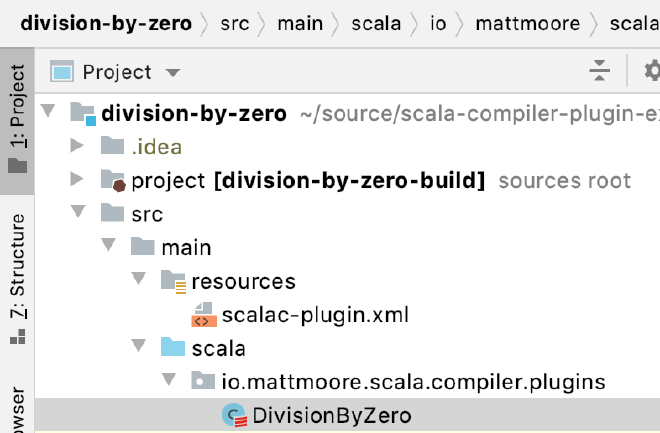Compiler Phases#
If you’re reading this you probably know what a compiler is. It takes your source code and converts it to a program that can run on your machine. In a nutshell, the compiler converts your source code into tokens (this is called lexing), then converts those tokens into a tree (called parsing), then it goes through multiple steps, depending on the compiler in question. For example, with Scala, there would be steps to do type-checking and a whole host of other things. Finally, the compiler goes through a process called code generation that creates the binary program. Each step in the compiler is called a “phase”.
In Scala, you can actually see what these phases are. If you have the Scala compiler installed, you can run this command in your terminal to see them:
scalac -Xshow-phases
View compiler phases
phase name description
---------- -----------
parser scan and parse sources
typer type the trees
inlinedPositions check inlined positions
sbt-deps sends information on classes' dependencies to sbt
extractSemanticDB extract info into .semanticdb files
posttyper additional checks and cleanups after type checking
prepjsinterop additional checks and transformations for Scala.js
sbt-api sends a representation of the API of classes to sbt
SetRootTree set the rootTreeOrProvider on class symbols
pickler generates TASTy info
inlining inline and execute macros
postInlining add mirror support for inlined code
staging check staging levels and heal staged types
splicing splicing
pickleQuotes turn quoted trees into explicit run-time data structures
instrumentCoverage instrument code for coverage checking
firstTransform some transformations to put trees into a canonical form
checkReentrant check no data races involving global vars
elimPackagePrefixes eliminate references to package prefixes in Select nodes
cookComments cook the comments: expand variables, doc, etc.
checkStatic check restrictions that apply to @static members
checkLoopingImplicits check that implicit defs do not call themselves in an
infinite loop
betaReduce reduce closure applications
inlineVals check right hand-sides of an `inline val`s
expandSAMs expand SAM closures to anonymous classes
elimRepeated rewrite vararg parameters and arguments
refchecks checks related to abstract members and overriding
initChecker check initialization of objects
crossVersionChecks check issues related to deprecated and experimental
protectedAccessors add accessors for protected members
extmethods expand methods of value classes with extension methods
uncacheGivenAliases avoid caching RHS of simple parameterless given aliases
elimByName map by-name parameters to functions
hoistSuperArgs hoist complex arguments of supercalls to enclosing scope
forwardDepChecks ensure no forward references to local vals
specializeApplyMethods adds specialized methods to FunctionN
tryCatchPatterns compile cases in try/catch
patternMatcher compile pattern matches
preRecheck preRecheck
recheck recheck
preRecheck preRecheck
cc cc
elimOpaque turn opaque into normal aliases
explicitJSClasses make all JS classes explicit
explicitOuter add accessors to outer classes from nested ones
explicitSelf make references to non-trivial self types explicit as
casts
interpolators optimize s, f, and raw string interpolators
pruneErasedDefs drop erased definitions and simplify erased expressions
uninitialized eliminates `compiletime.uninitialized`
inlinePatterns remove placeholders of inlined patterns
vcInlineMethods inlines calls to value class methods
seqLiterals express vararg arguments as arrays
intercepted rewrite universal `!=`, `##` methods
getters replace non-private vals and vars with getter defs
specializeFunctions specialize Function{0,1,2} by replacing super with
specialized super
specializeTuples replaces tuple construction and selection trees
liftTry lift any try that might be executed on a non-empty
expression stack
collectNullableFields collect fields that can be nulled out after use in lazy
initialization
elimOuterSelect expand outer selections
resolveSuper implement super accessors
functionXXLForwarders add forwarders for FunctionXXL apply methods
paramForwarding add forwarders for aliases of superclass parameters
genericTuples optimize generic operations on tuples
letOverApply lift blocks from receivers of applications
arrayConstructors intercept creation of (non-generic) arrays and
intrinsify
erasure rewrite types to JVM model
elimErasedValueType expand erased value types to their underlying
implmementation types
pureStats remove pure statements in blocks
vcElideAllocations peep-hole optimization to eliminate unnecessary value
class allocations
etaReduce reduce eta expansions of pure paths
arrayApply optimize `scala.Array.apply`
addLocalJSFakeNews adds fake new invocations to local JS classes in calls
to `createLocalJSClass`
elimPolyFunction rewrite PolyFunction subclasses to FunctionN subclasses
tailrec rewrite tail recursion to loops
completeJavaEnums fill in constructors for Java enums
mixin expand trait fields and trait initializers
lazyVals expand lazy vals
memoize add private fields to getters and setters
nonLocalReturns expand non-local returns
capturedVars represent vars captured by closures as heap objects
constructors collect initialization code in primary constructors
instrumentation count calls and allocations under -Yinstrument
lambdaLift lifts out nested functions to class scope
elimStaticThis replace This references to static objects by global
identifiers
countOuterAccesses identify outer accessors that can be dropped
dropOuterAccessors drop unused outer accessors
checkNoSuperThis check that supercalls don't contain references to This
flatten lift all inner classes to package scope
transformWildcards replace wildcards with default values
moveStatic move static methods from companion to the class itself
expandPrivate widen private definitions accessed from nested classes
restoreScopes repair rendered invalid scopes
selectStatic get rid of selects that would be compiled into GetStatic
junitBootstrappers generate JUnit-specific bootstrapper classes for
Scala.js
Collect entry points collect all entry points and save them in the context
collectSuperCalls find classes that are called with super
repeatableAnnotations aggregate repeatable annotations
genSJSIR generate .sjsir files for Scala.js
genBCode generate JVM bytecode
You can create your own phases and add them to the compiler after any of those phases. The information from a given phase then lets you modify the results of that phase before the compiler moves to the next phase. This allows you to modify the behavior of the compiler itself.
Why Create a Plugin?#
Suppose you wanted to add some functionality to Scala itself that doesn’t currently exist. Compiler plugins allow us to do just this. For the purposes of this article, I’m going to demonstrate how you might create a plugin to catch division by zero.
Let’s write a program in Scala to divide by zero:
object Test {
val five = 5
val amount = five / 0
def main(args: Array[String]): Unit = {
println(amount)
}
}
If you compile this with scalac Test.scala and run it with scala Test, the compilation will succeed but running it will result in a Java arithmetic error. What if we can detect division by zero when compiling, and halt compilation? This would enable us to prevent releasing this code to production by accident. Let’s take a look at how this process works.
Create an SBT Project#
First, create a new sbt project:
sbt new scala/scala-seed.g8
You can fill in the details however you’d like. Take a look at the example plugin project I’ve created here. You can always use this as a starting point.
Important Details for Compiling as a Plugin#
Key components you’ll need in your plugin project:
build.sbt#

name := "division-by-zero"
version := "0.0.1-SNAPSHOT"
scalaVersion := "2.13.5"
organization := "io.mattmoore.scala2.compiler.plugins"
libraryDependencies += "org.scala-lang" % "scala-compiler" % "2.13.5"
sbtPlugin := false
resources/scalac-plugin.xml#

<plugin>
<name>division-by-zero</name>
<classname>io.mattmoore.scala2.compiler.plugins.DivisionByZero</classname>
</plugin>
DivisionByZero.scala#

package io.mattmoore.scala2.compiler.plugins
import scala.tools.nsc
import nsc.Global
import nsc.Phase
import nsc.plugins.Plugin
import nsc.plugins.PluginComponent
class DivisionByZero(val global: Global) extends Plugin {
import global._
val name = "division-by-zero"
val description = "checks for division by zero"
val components = List[PluginComponent](Component)
private object Component extends PluginComponent {
val global: DivisionByZero.this.global.type = DivisionByZero.this.global
val runsAfter = List[String]("refchecks")
val phaseName = DivisionByZero.this.name
def newPhase(_prev: Phase) = new DivByZeroPhase(_prev)
class DivByZeroPhase(prev: Phase) extends StdPhase(prev) {
override def name = DivisionByZero.this.name
def apply(unit: CompilationUnit): Unit = {
for (tree@Apply(Select(rcvr, nme.DIV), List(Literal(Constant(0)))) <- unit.body
if rcvr.tpe <:< definitions.IntClass.tpe) {
global.reporter.error(tree.pos, "attempting division by zero")
}
}
}
}
}
There’s a lot going on in this file. We’ll examine it piece by piece. We’ve created an object called Component that extends PluginComponent, which is the underlying Scala class that represents a plugin.
private object Component extends PluginComponent
Then we specify the phase it should run after. Remember the phases we listed earlier with the scalac -Xshow-phases command we ran earlier? For this plugin, we are running it after the refchecks phase. It’s out of the scope of this article to explain why. I’ll have to write up another post explaining the individual phases later. For now, just humor me.
val global: DivisionByZero.this.global.type = DivisionByZero.this.global
val runsAfter = List[String]("refchecks")
val phaseName = DivisionByZero.this.name
def newPhase(_prev: Phase) = new DivByZeroPhase(_prev)
Next we’re defining the function DivByZeroPhase that we’re going to run during the new phase we’ve created. This is where the magic happens. We check to see if each node in the tree contains a division by zero.
We’re defining the apply method here which takes the CompilationUnit (the node in the tree) and does the check for division by zero. The nme.DIV is the division type.
Finally we call global.reporter.error(tree.pos, “attempting division by zero”) which will halt the Scala compiler and display the error message.
class DivByZeroPhase(prev: Phase) extends StdPhase(prev) {
override def name = DivisionByZero.this.name
def apply(unit: CompilationUnit): Unit = {
for (tree@Apply(Select(rcvr, nme.DIV), List(Literal(Constant(0)))) <- unit.body
if rcvr.tpe <:< definitions.IntClass.tpe) {
global.reporter.error(tree.pos, "attempting division by zero")
}
}
}
Now you’re ready to compile the compiler plugin for division by zero. Run this command to compile it, generate a jar file and publish the plugin to your local Ivy repository:
sbt compile package publishLocal
Add the Plugin to Your Project#
Now that we’ve got our plugin compiled and published to the local Ivy repository.
build.sbt#
The resolvers section tells the project to load the plugin from the Ivy repository on your local machine.
autoCompilerPlugins := true
addCompilerPlugin("io.mattmoore.scala2.compiler.plugins" %% "division-by-zero" % "0.0.1-SNAPSHOT")
resolvers += Resolver.mavenLocal
That’s it! now if you run sbt compile the Scala compiler should run the division by zero plugin against your project. If it finds any divisions by zero, it will error out and not continue with compilation. You can disable the plugin by commenting (or removing) the addCompilerPlugin line.
Lets compile the project without the plugin. Note that it will compile successfully but fail when we run it.
sbt compile
[info] Loading global plugins from /Users/mattmoore/.sbt/1.0/plugins
[info] Loading project definition from /Users/mattmoore/source/scala-compiler-plugin-example/use-plugins/division-by-zero/project
[info] Loading settings for project root from build.sbt ...
[info] Set current project to Using the division-by-zero plugin. (in build file:/Users/mattmoore/source/scala-compiler-plugin-example/use-plugins/division-by-zero/)
[info] Executing in batch mode. For better performance use sbt's shell
[info] Compiling 1 Scala source to /Users/mattmoore/source/scala-compiler-plugin-example/use-plugins/division-by-zero/target/scala-2.13/classes ...
[success] Total time: 3 s, completed Apr 21, 2020 7:20:44 PM
Let’s try running the program. You’ll notice it fails when running because division by zero (as most programmers and mathematicians know) is undefined.
sbt run
[error] Caused by: java.lang.ArithmeticException: / by zero
[error] at Test$.(Test.scala:3)
[error] at Test.main(Test.scala)
[error] at sun.reflect.NativeMethodAccessorImpl.invoke0(Native Method)
[error] at sun.reflect.NativeMethodAccessorImpl.invoke(NativeMethodAccessorImpl.java:62)
[error] at sun.reflect.DelegatingMethodAccessorImpl.invoke(DelegatingMethodAccessorImpl.java:43)
[error] at java.lang.reflect.Method.invoke(Method.java:498)
Now let’s compile the project with the plugin enabled. Note that it fails during compilation with the error message we added in the plugin.
sbt compile
[info] Loading global plugins from /Users/mattmoore/.sbt/1.0/plugins
[info] Loading project definition from /Users/mattmoore/source/scala-compiler-plugin-example/use-plugins/division-by-zero/project
[info] Loading settings for project root from build.sbt ...
[info] Set current project to Using the division-by-zero plugin. (in build file:/Users/mattmoore/source/scala-compiler-plugin-example/use-plugins/division-by-zero/)
[info] Executing in batch mode. For better performance use sbt's shell
[info] Compiling 1 Scala source to /Users/mattmoore/source/scala-compiler-plugin-example/use-plugins/division-by-zero/target/scala-2.13/classes ...
[error] /Users/mattmoore/source/scala-compiler-plugin-example/use-plugins/division-by-zero/src/main/scala/io/mattmoore/Test.scala:3:21: attempting division by zero
[error] val amount = five / 0
[error] ^
[error] one error found
[error] (Compile / compileIncremental) Compilation failed
[error] Total time: 2 s, completed Apr 21, 2020 7:19:39 PM
And that’s it! You’ve written your first Scala compiler plugin and run it in a project. But that’s not all compiler plugins are capable of. In the next Scala compiler post we’ll look at how to transform code, which allows us to add entirely new semantics to Scala.

